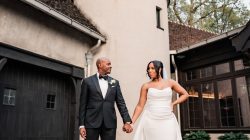A couple of days after Aishat Bolomope’s wedding on Dec. 31, the newlywed realized that she might be spending her honeymoon on the choppy seas of internet outrage. Friends from as far as her native Nigeria said they recognized her in a video clip that drew millions of views online.
A dispute between a wedding party and a coffee shop in Indianapolis had turned into a referendum on wedding etiquette and cultural norms, all of it warped by the distorting lens of social media.
“The more I read, the more it broke my heart,” said Ms. Bolomope, a 28-year-old engineer.
At the center of the maelstrom are the mother-daughter duo that runs the coffee shop, Mansion Society, and a young Nigerian couple (Ms. Bolomope and her husband, Opeyemi Akanni, 27) who wanted to marry there.
Ms. Bolomope said that she was a regular customer at Mansion Society, which occupies a ground-floor space in the Central State Mansion, an apartment building that had once been part of a psychiatric hospital. On Dec. 5, Ms. Bolomope went there to speak with the building’s manager, Isaac Barrow, about holding a small wedding ceremony in the coffee shop.
After speaking with Ms. Bolomope, Mr. Barrow emailed Ana Lezama, 31, who is from Mexico and runs Mansion Society with her mother, Zoraida Lezama, 49, to inform her that a small group would be coming “to just sign wedding docs.” The group wanted to “reserve one of the long tables and will buy some coffee,” Mr. Barrow wrote. “I didn’t really think about it at all after that,” he said.
Pop-up or flash weddings have become increasingly popular among young Americans who are embracing more informal and cost-effective wedding options. They may also look askance at displays of ostentation like designer gowns and showstopping wedding cakes.
To save money, some couples hold weddings in parks or other public spaces that don’t charge exorbitant fees. The key is flexibility, said Lauren Gunn, a pop-up wedding planner in New York. “Sometimes, there are going to be pivots,” she said.
And sometimes, there are going to be misunderstandings. “Pop-up anything will always run the risk of unforeseen issues,” said Danielle Lea, a wedding planner based in Indianapolis. “The use of unorthodox locations has increased over the years. However, not all these locations lend themselves to weddings.”
Mr. Barrow happened to be in the coffee shop when a wedding party of about 20 well-dressed people appeared. Mr. Barrow suddenly remembered his meeting with Ms. Bolomope three weeks earlier, which he admitted he had “totally forgotten” about until then.
Mr. Barrow said that he and Ana Lezama had been too “shocked” to intervene. “We just kind of let it happen,” he said. “What am I going to do, break up a wedding?”
Mr. Barrow stayed for the entire half-hour ceremony. “It wasn’t all that disruptive,” he recalled. “I mean, it’s New Year’s Eve. There’s nobody there.” Toward the end of the wedding, he said, guests crowded the coffee shop in a way that would have made it difficult for other customers to enter. But on the whole, “they weren’t harming anybody,” he said.
Nigerian weddings tend to be lavish, colorful affairs that incorporate Yoruba, Igbo and other traditions. The couple plans to hold such a ceremony in Ibadan, the city in Nigeria where Ms. Bolomope was raised. But first, they simply wanted to dispense with the formalities, and the local Instagrammable cafe seemed like the ideal setting. “I am a member of that community,” Ms. Bolomope said of the Indianapolis area. “There’s no strangers that showed up.”
Lesley Acevedo, who runs a business called Indy Get Married, officiated the ceremony. Ms. Acevedo had planned to hold the wedding at her office but was told at the last minute that the guest list had grown and a new venue had been chosen. She thought little of the change. “I just show up and marry ’em,” Ms. Acevedo said.
The scene at Mansion Society struck her as disorganized. “It was something that was just really not planned,” she said. Still, she proceeded with the ceremony. In less than an hour, it was all over. But the social media controversy was just beginning.
In a long post on Mansion Society’s Instagram account, the shop owners described what had been an “odd eventful day.” The tone was gentle, almost intimate, the text set against a soothing peach background. Calling Ms. Bolomope a “beautiful bride,” they recounted how a wedding party “took over” the coffee shop, asking baristas to tend to coats and purses while blocking other patrons from entering. The owners asked customers to formally book Mansion Society if they wanted to hold an event there instead of “showing up and taking control of our small business with no notice or any sort of monetary prearrangement.”
During the initial meeting on Dec. 5, there had been no talk of payment. Ms. Bolomope said she had understood from Mr. Barrow that she and Mr. Akanni did not need to reserve the venue as long as their guests bought drinks or baked goods. (The couple’s backup plan, in case Mansion Society fell through, was simple: They would marry at home.)
After the wedding, that changed. In an email exchange with Mr. Barrow and the younger Ms. Lezama, Ms. Bolomope acknowledged that the wedding party had been larger than she initially thought.
“I’m willing to make a $200 donation to the coffee shop if possible,” she wrote.
Mr. Barrow called for $725, citing “lost sales.” (Ana Lezama said over email that the entire wedding party had bought only six lattes and four croissants. The total came to about $50. There was no tip, she said.)
“That is unreasonable,” Ms. Bolomope wrote back about Mr. Barrow’s suggested fee.
The younger Ms. Lezama entered the fray. “We don’t need a donation of $200,” she wrote. “We need you to pay the fee to use a place that you did not previously hire for a wedding ceremony.”
On Jan. 2, an update about the payment controversy appeared on Mansion Society’s Instagram page. This time, the Lezamas included a brief video clip of the ceremony.
Interest in the story had been building on Instagram before spreading to a Reddit page dedicated to “wedding shaming.” And then it reached the platform that is almost perfectly suited to generate outrage.
“I’m obsessed with the audacity of this wedding party,” a user with the handle @0ldoini wrote on X, formerly known as Twitter, on Jan. 6. The user’s post took off, garnering nearly 16 million views.
From the start, the reactions were almost wholly negative. “I am in shock,” Andrew Roby, a wedding planner, wrote. The video posted on Jan. 2 also introduced race into the public discussion, since it was apparent from the clip that the bride and groom were Black, as were some of their wedding party members. Racist comments proliferated in response to the original post on X, and in ensuing media coverage.
Some wedding experts maintain that the wedding party is in the wrong. “Personally, I am disgusted with what the couple did,” David Tutera, an event designer, wrote in an email. “This couple should not only be ashamed, but they should be embarrassed.”
Ms. Acevedo, the officiant, wonders if Ms. Bolomope sabotaged her wedding by not clearing every detail with Mansion Society beforehand. “You crashed your own wedding,” she said.
As for Ms. Bolomope, she continues to reel. “I had to step back and think, Am I a bad person?” she said. “Did I do wrong? How, as a member of my community, could I have done this better?”
She and Mansion Society never managed to agree on a fee, but a GoFundMe campaign for the coffee shop raised $756.
This is not how Ms. Bolomope wanted to start her married life, but she is determined to not be defined by a single mishap. “I would like to completely move on from this,” she said.
Sumber: www.nytimes.com










